 This summer, Kaitlyn Hiis LaRose ’26 (CLAS), ’26 (ED), ’27 MA focused on cleaning public beaches in Connecticut and assessing the debris. For more on their project, please see the full story in UConn Today.
This summer, Kaitlyn Hiis LaRose ’26 (CLAS), ’26 (ED), ’27 MA focused on cleaning public beaches in Connecticut and assessing the debris. For more on their project, please see the full story in UConn Today.
Student Achievement
Jenna Ulizio ’26 and Everett Padro ’26 presenting at int’l virtual conference 6/19
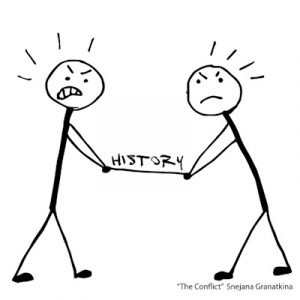 Jenna Ulizio ’26 and Everett Padro ’26 will present at the online seminar “Public history for contested and conflicting past(s)” on Thursday, June 19. The seminar is organized by the students of the Master in Digital and Public History (MADiPH) at the University of Luxembourg:
Jenna Ulizio ’26 and Everett Padro ’26 will present at the online seminar “Public history for contested and conflicting past(s)” on Thursday, June 19. The seminar is organized by the students of the Master in Digital and Public History (MADiPH) at the University of Luxembourg:
The past is subject to multiple historical interpretations. Perhaps more than ever, the current context offers many examples of contested – and sometimes conflicting – views and interpretations of the past. Beyond certain events and topics that appear very controversial, the overall production, mediation, and discussion of history are also at stake. The very existence, practices and discussion of evidence-based research are sometimes threatened. In this context, we may question what public history can bring to the discussion, what roles historians (still) have in the public interpretations of the past. How does public history deal with controversies, handle contested and conflicting topics?
Grace Easterly Selected as 2024-25 CWAR Institute Fellow
Grace Easterly has been selected as a 2024-2025 fellow at the Cold War Archives Research Institute.
The Cold War Archives Research Institute at the Wilson Center has two objectives: “to stimulate original scholarship on the interplay between soft and hard power in the cold and hot wars between 1945 and 1991; and to demonstrate the power of cooperative scholarship through innovative archival practices”. This highly competitive fellowship seeks to train graduate level students in archival research methodologies, and hone the CWAR fellows “critical research skills in historical and archival methodologies, further their own research agendas in Cold War history, improve their communication and presentation skills, and develop a network of supportive professional contacts”.
Congratulations to Grace Easterly on this impressive achievement!
2022 Graduate Prize Day Winners
On April 29, the History Department closed out the semester with a celebration of our graduate students. We congratulate you!
Hugh M. Hamill Graduate Fellowship in Latin American History
Catalina Vásquez-Marchant
Daniela Itzel Domínguez Tavares
Graduate Student Teaching Excellence Award
Marc Reyes
Harry J. Marks Fellowship
Anna Kittredge
Bruce M. & Sondra Astor Stave Prize in Recent American History
Britney Murphy
Albert E. & Wilda E. Van Dusen Award
Lincoln Hirn
Thomas G. Paterson Graduate Fellowship in the History of U.S. Foreign Relations
Grace Easterly
Sandra Rux Award
Rachel Hendrick
Undergraduate Honors Student Thesis Spotlight: Renee Semple
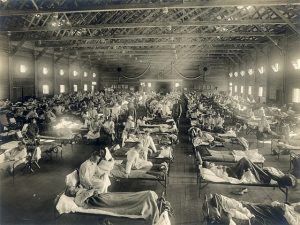 A timely thesis from UConn grad ’21 Renee Semple who explored how narrative shapes public response and cultural memory. In examining the narratives crafted around the 1918 and 1957 influenza pandemics, Semple details the danger of historical erasure in the elevation of certain narratives over others. A job well done!
A timely thesis from UConn grad ’21 Renee Semple who explored how narrative shapes public response and cultural memory. In examining the narratives crafted around the 1918 and 1957 influenza pandemics, Semple details the danger of historical erasure in the elevation of certain narratives over others. A job well done!
Renee Semple, “Preferred Narratives and Their Impact on Historical Memory: An Examination Through Comparison of Twentieth Century Pandemics”
Thesis Advisor: Dr. Shirley Roe
Societal response to a crisis and the narratives that emerge from the event(s) often vary and oppose one another. A narrative can be considered a point of view or a lens that is often cultivated through experiences and carries its own tone while telling events. This thesis compares the narratives that emerged from both the 1918 and 1957 influenza pandemics. Examining the 1918 influenza pandemic reveals both a public and a private narrative, in which the public narrative is the preferred out of the two. Filled with optimism, the preferred public narrative focused on moving forward and furthering scientific research—a modernist view that overshadowed the private narrative. This pattern is discovered in the influenza pandemic of 1957; the two narratives emerge, with the public one as the preferred narrative. By comparing these two pandemics within fifty years of one another, it is clear that a pattern of societal response and preferred narratives emerges out of these public health crises. The narratives created during the pandemics persisted afterwards by influencing the cultural memory and perpetuating instances of historical erasure.
Undergraduate Honors Student Thesis Spotlight: Kasey Schempf
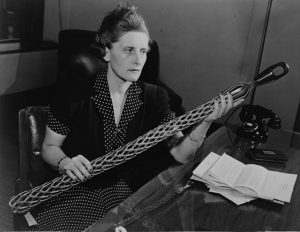 UConn History undergraduate alum Kasey Schempf blends questions of taxation and representation in her examination of Vivien Kellems. Interested in exploring a “feminist rebranding” of the crusader for tax equality, Schempf looks to the CT-based activism of a woman considered to a feminist visionary.
UConn History undergraduate alum Kasey Schempf blends questions of taxation and representation in her examination of Vivien Kellems. Interested in exploring a “feminist rebranding” of the crusader for tax equality, Schempf looks to the CT-based activism of a woman considered to a feminist visionary.
Kasey Schempf, “Unveiling the Feminist Character of Vivien Kellems”
Thesis Advisor: Dr. Peter Baldwin
Vivien Kellems was undoubtedly a crusader for tax equality, inspiring many later movements. The Connecticut businesswoman openly despised the Federal Income Tax, among other taxes. She certainly wasn’t afraid to share her opinion, even if it wouldn’t make her any friends. However, in the late 1960s, Kellems began to appeal to a new demographic: young, unmarried women. She moved away from her radical, conservative language and assumed the role of the “spinster,” advocating for younger women. She aligned herself with the movement against the Singles Penalty, or the notion that single tax filers were “penalized” for remaining single. As a result, Kellems is typically praised by scholars as a feminist leader and supporter of Second-Wave Feminism.
This paper aims to examine the transformation of Vivien Kellems from a radical political character to a common household name as she strategically campaigned for single tax filers. Moreover, this study will highlight the activist efforts of Kellems and investigate the possibility of a “feminist rebranding” to secure more supporters for her true motive: to overhaul the American tax system.
Undergraduate Honors Student Thesis Spotlight: Shankara Narayanan
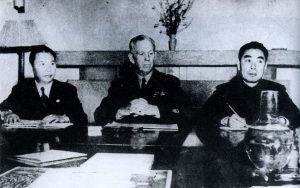 UConn ’21 grad Shankara Narayanan explored the power of discourse in the making of US-China relations. A fascinating and timely study.
UConn ’21 grad Shankara Narayanan explored the power of discourse in the making of US-China relations. A fascinating and timely study.
Shankara Narayanan, Knowing China, Losing China: Discourse and Power in U.S.-China Relations
Thesis Advisor: Dr. Alexis Dudden
The U.S. government’s 2017 National Security Strategy claimed, “China and Russia challenge American power, influence, and interests, attempting to erode American security and prosperity.” Three years later, the COVID-19 pandemic has accelerated the U.S. foreign policy community’s discursive shift towards Realist competition with China, with officials from the past three presidential administrations coming to view China as a threat to democratic governance and America’s security posture in Asia. The discourse underpinning the U.S.-China relationship, however, remains understudied. During key moments in the relationship, U.S. policymakers’ Realist intellectual frameworks failed to account for Chinese nationalism, suggesting a problem embedded within America’s strategic discourse. This manuscript uses discourse analysis to analyze why and how American officials failed to create a strong, united, and democratic China during the Marshall Mission (1945-1947), arguing that the use of Realist constructs, great-power frameworks, and theories of geopolitical realism prevented them from accounting for Mao Zedong’s postcolonial nationalism, leading to the Mission’s failure.
Undergraduate Honors Student Thesis Spotlight: Nicole Mooradd
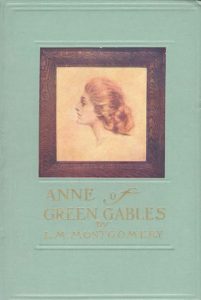 For their senior honors thesis, UConn History ’21 graduate Nicole Mooradd explored Progressive Era children’s literature, marking shifts in gender norms, child-rearing, and notions of “respectable” girlhood. A job well done!
For their senior honors thesis, UConn History ’21 graduate Nicole Mooradd explored Progressive Era children’s literature, marking shifts in gender norms, child-rearing, and notions of “respectable” girlhood. A job well done!
Nicole Mooradd, “’Just Be Glad’: Fiction for Girls during the Progressive Era, 1897-1920”
Thesis Advisor: Dr. Peter Baldwin
Prior to the early twentieth century, most children’s books were written for boys and focused on a specifically masculine set of characteristics. Following the release of Little Women in the mid-nineteenth century and the emergence of first-wave feminism, the Progressive Era brought about a new time for literature to thrive, specifically books written explicitly for female children. Many of these books written for girls were by female authors and focused on domestic stories of girls going through an average and expected life. These stories reflect the distinct gender roles expected for female children to adhere to as they grow older and enter into adulthood. This essay argues that these stories use “goodness” and its influence on the concept of feminine duty to highlight typical feminine gender roles that the authors want young readers to emulate as they grow older. Although the women’s place was changing in society, there were still a continuing emphasis of domesticity, womanhood, and childhood that females could not escape. I will focus on three domestic fiction stories, Kate Douglas Wiggins Rebecca of Sunnybrook Farm, Eleanor H. Porter’s Pollyanna, and Lucy Maud Montgomery’s Anne of Green Gables to explore these themes. These stories were staples of literature that were popular for young American girls during the Progressive Era and continue to be incredibly famous stories that influence society in the present.
Undergraduate Alumni Spotlight: Sulema DePeyster in the Field
 We are thrilled to announce that UConn History ’21 graduate Sulema DePeyster has decided to continue her work in community-based historical engagement. She has joined the Windsor Historical Society as the first Community History Specialist. In this newly created position, DePeyster will design oral history projects that engage the Windsor community. During her time at UConn, DePeyster worked with History Professor Fiona Vernal on several oral history projects that made the untold stories of Windsor residents more visible and accessible. DePeyster’s commendable work garnered awards including the Undergraduate History Excellence Award and the Sandra Rux Fellowship. Read more about Sulema DePeyster in this article from the Windsor Historical Society. Congratulations! We look forward to this next chapter.
We are thrilled to announce that UConn History ’21 graduate Sulema DePeyster has decided to continue her work in community-based historical engagement. She has joined the Windsor Historical Society as the first Community History Specialist. In this newly created position, DePeyster will design oral history projects that engage the Windsor community. During her time at UConn, DePeyster worked with History Professor Fiona Vernal on several oral history projects that made the untold stories of Windsor residents more visible and accessible. DePeyster’s commendable work garnered awards including the Undergraduate History Excellence Award and the Sandra Rux Fellowship. Read more about Sulema DePeyster in this article from the Windsor Historical Society. Congratulations! We look forward to this next chapter.
Undergraduate Honors Student Thesis Spotlight: Abigail Meliso
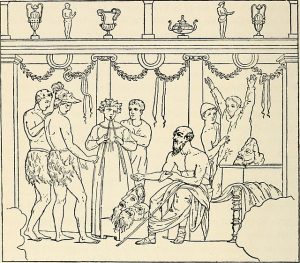 For their senior honors thesis, UConn History ’21 graduate, Abigail Meliso, reflected on the roles and contributions of women to theater in Ancient Greece. Great work!
For their senior honors thesis, UConn History ’21 graduate, Abigail Meliso, reflected on the roles and contributions of women to theater in Ancient Greece. Great work!
Abigail Meliso, “Greek Women and the Theatre: An Analysis of the Presence and Participation of Women in Ancient Greek Theater”
Thesis Advisor: Dr. Joseph McAlhany
Western drama can trace its lineage back thousands of years to classical Greece. We see the impact of classical playwrights still in modern theater, as well as various other areas of our society. Even now, students are assigned Antigone in high school and Oedipus has had his troubles immortalized in psychiatric jargon. However, as ubiquitous and easily accessible as it is now, scholarship throughout the years has debated how inclusive classical Greek theater was, particularly in regards to whether women were permitted to participate in or even observe performances. While it has proven popular to deny this possibility, given the occasional raunchiness of the plays and the limited autonomy of women at the time, some evidence suggests that, not only were women present in the audience of theatrical festivals, but sometimes a few select women would perform publicly.